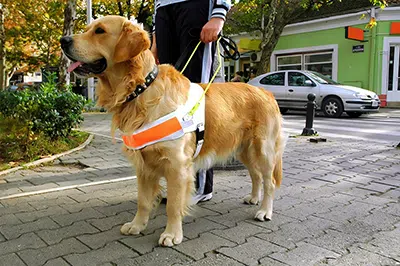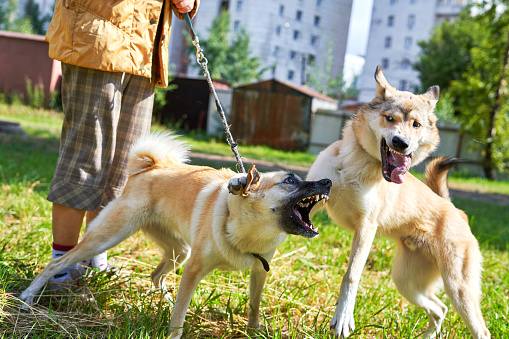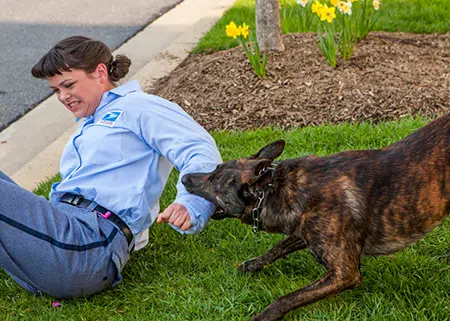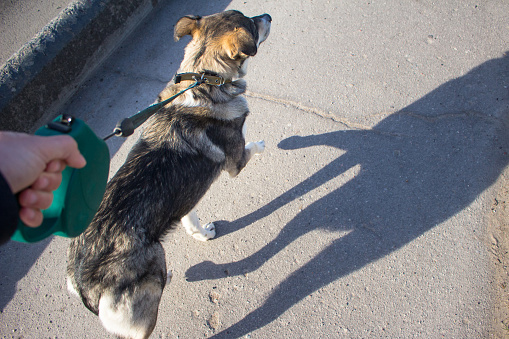
An individual with a disability may need support from a service animal throughout their entire life. Both federal laws and the laws in Ohio offer various types of protection for using a service animal in different situations, such as public areas, employment premises, housing, educational institutions, and public transportation.
A person with a disability who requires the use of a service animal should be aware of their legal rights and responsibilities under specific Ohio laws and federal laws.
Based on the situation, the rights and responsibilities of a person with a disability concerning the use of service animals could be covered under the ADA (Americans with Disabilities Act), the Ohio Revised Code, and the Ohio Administrative Code. These laws provide various standards for the use of a service animal.
Definition of Service Animal under the Law
The ADA has narrowly defined the service animal to include only a dog, or in special circumstances, a miniature horse. Ohio law, on the other hand, offers a broader definition that arguably includes any animal. In other words, a service animal under the ADA definition is essentially a service dog, while under the law in Ohio, it is a service animal in a broader sense.
Under both federal and Ohio laws, a service animal is not a pet but a working animal. The ADA defines a service animal as a dog trained to perform tasks or do work to support a person with a disability, including a physical, psychiatric, intellectual, sensory, or other mental disability.
Whether domestic or wild, untrained or trained, other animal species are not considered service animals under the ADA Title III-like your goldfish or your pet hamster! The only exception is a miniature horse, which is allowed as a service animal in specific situations.
Service Animals in Public Accommodation Places
A person with a disability, accompanied by a service dog under the ADA, and a service animal under the Ohio law, can visit all public accommodation areas where other people are allowed to visit.
Examples of public accommodation places include restaurants, hotels, bars, film theaters, grocery, and other retail stores, sports stadiums, hospitals, and medical service provider offices, banks, gas stations, laundromats, public transportation stations, libraries, museums, schools, and other educational institutions, and places of exercise or recreation.
Under both the federal and Ohio laws, any private company or organization that offers services to the people is required to modify its practices, policies, and procedures to allow the use of service animals by people with disabilities.
Public Accommodation Places: Rights under Ohio Law
The Ohio Administrative Code § 4112-5-06 says that a public accommodation place is prohibited from discriminating against people with disabilities, including refusing them the use of an “animal assistant.” It further says that such places cannot even require a person with a disability to pay any extra charges for using such an animal assistant.
The Ohio Administrative Code § 4112-5-02, which defines an animal assistant, in fact, does not restrict protections only to dogs as animal assistants. It describes an animal assistant to include any animal that aids an individual with a disability. This could include a dog that alerts a deaf individual to sound, a dog that guides a visually impaired individual, or a monkey retrieving or collecting objects for a mobility-impaired individual.
Therefore, if a person with a disability requires a service animal, which is not a dog, to accompany them to a public accommodation place, they are protected under this provision of the law in Ohio.
Another Ohio law provision creates slight confusion as it relates only to the service dog. The Ohio Revised Code, which covers ‘assistance dogs,’ says that if a hearing impaired, visually impaired, or mobility-impaired individual, is accompanied by an assistant dog, they will be entitled to complete and equal accommodation, facilities, advantages, and privileges of all public accommodation places as well as other places where people are invited or allowed to be.
The assistance dog trainer is entitled to all the same privileges, and they cannot be charged extra for bringing the dog. Additionally, any dog currently under training as an assistance dog should be covered by an insurance policy given by the agency that is training the dog.
Definition of an Assistance Dog under Ohio Law
The Ohio Revised Code § 955.011 narrowly defines an assistance dog as a guide dog, which has been specifically trained or is currently under training to assist a visually impaired person; a hearing dog, which has been specifically trained or is currently under training to assist a hearing-impaired person; and a service dog, which has been specifically trained or is currently under training to assist an individual who is mobility impaired. A special nonprofit agency should have trained the dog.
Any requirement within the Administrative Code or the Ohio Revised Code that conflicts with the ADA in all likelihood gets pre-empted by the ADA. Therefore, a stringent Ohio law required to keep the assistance dog leashed probably gets superseded by the more flexible standards of the ADA. Furthermore, the Ohio law requirement of having the assistance dog trained by a special nonprofit agency may also be superseded by the ADA.
Furthermore, if an individual requires a service animal, which is not covered within the definition of the Ohio Revised Code § 955.011, they may assert their rights under the Ohio Administrative Code 4112-5-06 or ADA Title III.
Right to Use Service Animals at Home
Individuals with a disability can rightfully use a service animal in their home or apartment, even when the landlord or another housing provider forbids pets. The Fair Housing Amendment Act prohibits any discrimination against a person with a disability in terms of rental or sale of housing and the provision of facilities or services of the housing.
Under the Act, “discrimination” covers denial of reasonable accommodation in practices, policies, rules, or services, where such accommodation may be required to afford an individual with a disability equal opportunity to make use of a dwelling.
This also includes common and public areas. Therefore, when a tenant with a disability requires a service animal in a house, then the landlord generally will have to allow it, even if pets are prohibited or restricted in the apartment.
Service Animals at Home: Ohio Law
Under Ohio law, an individual with a disability can rightfully use a service animal in their home or apartment, even when the landlord or another housing provider forbids pets.
Specifically, the law in Ohio provides that an individual with a disability who has an animal assistant is entitled to keep it on the premises rented, leased, subleased, purchased, or assigned by such an individual.
Ohio law further says that such an individual is not required to pay any additional charges for the animal assistant but will be liable if any damages occur to the premises because of the animal assistant.
Service Animals at the Workplace: Ohio Law
Ohio law permits an individual with a disability to use a service animal at their place of work. The Ohio Revised Code provides almost identical protection as the ADA Title I to employees with disabilities who require a reasonable accommodation to carry out their job. The only difference is that the employers covered under this law in Ohio must have at least four employees, while the ADA Title covers employers with at least 15 employees.
A reasonable accommodation, in this case, refers to any adjustment to the work environment and/or in the practices or policies of the employer which will enable an employee with a disability to carry out the essential functions of their position. If an employee requires the use of their service animal to carry out their job at the workplace, the employer should treat that requirement as any other requirement for reasonable accommodation for a worker’s disability.
The responsibility for the monitoring and care of the service animal will lie with the employee. But the employer may be required to provide sufficient flexibility to the employee so that the animal can be taken out to relieve itself and give additional care as needed during the workday.
Service Animal Needs of Students: Ohio Law
Universities, public schools, and school districts in Ohio, apart from any post-graduate, undergraduate, secondary, elementary, or nursery private school and any other educational institution, are protected under federal law, bound by ADA Title II and Title III.
Service animals may offer valuable assistance to a student attending school and having a disability. For instance, an adolescent with a separation anxiety disorder and social phobia may need to use a service animal for transitional support to leave home and visit the school.
A diabetic student may require a service dog to alert them when their blood sugar level becomes too low or high. A student who has cerebral palsy might require a service animal to assist them in lifting objects, opening doors, or otherwise helping them within the school environment.
A student in Ohio requiring a service animal at school also receives protection under Ohio law. The Ohio Revised Code § 955.43 provides that a person who is mobility impaired, visually impaired, or hearing impaired and requires a service dog for assistance is entitled to complete and equal accommodations, facilities, advantages, and privileges in all educational institutions.
The education institution, in this case, includes all elementary and secondary schools run by an education board, all chartered and non-chartered elementary and secondary non-public schools, schools registered by the state board, state universities and colleges, and private universities and colleges.
It is important to note that, compared to Ohio law, the ADA Title II and Title III give a broader definition of a service animal. Therefore, depending on the case, a student in Ohio may have to assert their rights under federal law.
Service Animals in Public Transport: Ohio Law
An individual with a disability is allowed to bring their service animal on a mode of public transportation and other means of transportation. Public and private transportation service providers are regulated in this regard by the US DOT, covered by the ADA Title II and Title III. The providers are required to allow a service animal to accompany an individual with a disability in a vehicle or facility, including taxi cabs, buses, and so forth.
Ohio law on this issue says that any public means of transportation by land, air, or water must not deny an individual with a disability the right to bring an animal assistant. They also cannot require such individuals to pay any extra charges for the animal assistant’s attendance. An animal assistant, in this case, is described as any animal that aids an individual with a disability.
The Ohio Revised Code § 955.43 covers assistance dogs similar to the ADA and imposes a few limitations. The service animal is not allowed to use a seat in public transportation; it must be on a leash while utilizing the facilities of public transportation, and a dog that is under training to be an assistance dog is required to be covered under an insurance policy given by the special nonprofit agency that is training the assistance dog.
Registration of a Service Animal in Ohio
Ohio law says that an individual makes an application for the registration of an assistant dog (defined as per the Ohio Revised Code § 955.011). The owner can present proof in the form of a certificate or another form to show that the animal is an assistant dog. The owner will then be exempted from paying the registration fee that would otherwise apply.
The registration of an assistant dog will be permanent, and there is no requirement for annual renewal as long as the animal remains an assistant dog. The owner will receive tags and certificates with a stamp saying “Permanent Registration – Ohio Assistance Dog” and carry a permanent registration number. The benefit of this registration is that the animal’s owner gets exempted from the registration fee and other requirements for annual renewal that apply to other dogs.
We advocate strongly on behalf of injured victims of dog bites across Ohio, with convenient locations in Akron, Canton, Cincinnati, Cleveland, Columbus, and Toledo.





